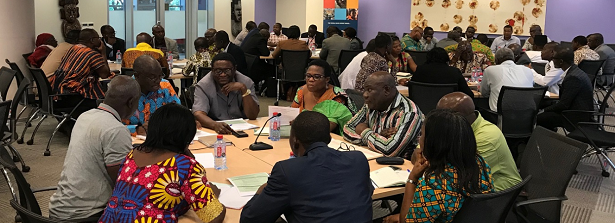Inventory on Dutch partnerships in support of SHAEA

In order to improve the relevance of agricultural higher education and research for labour markets and for evidence-based policy making on rural transformation in Africa, the regional project Strengthening Higher Education for Agri-Food Transformation in Africa (SHAEA) is being developed. SHAEA is a proposed regional loan of the World Bank to six African countries to strengthen linkages between selected anchor universities and the regional agricultural sector. To create mutual benefit and set up sustainable cooperation networks, one of the identified activities to support the development of SHAEA was an inventory of existing institutional relations (academic and professional education, scientific and applied research) between the Netherlands and Africa (in the SHAEA countries in particular). The inventory was commissioned to Nuffic by the Food & Business Knowledge Platform.
Please download the Final report “Inventory of Dutch partnerships in support of SHAEA” (PDF).
The World Bank engaged in dialogue with the Regional Universities Forum for Capacity Building in Agriculture (RUFORUM) and is developing SHAEA. In the context of the Netherlands – World Bank Group “Food for All” Partnership the initiative was taken to offer support in the development phase of SHAEA and explore the possible future role of Dutch stakeholders related to agricultural higher education in the implementation phase. The Orange Knowledge Programme (OKP) administered by Nuffic, on behalf of the Ministry of Foreign Affairs of the Netherlands, could be a good match in a collaborative effort with Knowledge Platforms (e.g. Food & Business Knowledge Platform), and/or the Borderless Network.
The inventory was aimed at providing an overview of partnerships and cooperation in agricultural higher education and research, between institutions in the Netherlands and nine prospective SHAEA countries: Kenya, Uganda, Ethiopia, Mozambique, Malawi, Ghana, Ivory Coast, Benin and Cameroon.
The objectives of the inventory were:
- Provide an overview of current and past collaboration in agricultural higher education and research between education institutes in the Netherlands and designated African countries.
- Provide an analysis of opportunities for relevant institutional linkages in the future.
Methodology for the inventory included a desk study, a questionnaire, semi-structured interviews, and focus group discussions.
Results and concluding remarks
The inventory has resulted in an interesting overview of 97 partnerships that have been established with support of selected Dutch and EU funding mechanisms. Out of these partnerships, 54 focused on research cooperation, 39 on educational capacity building, and 4 on education/mobility cooperation. Moreover, most partnerships focus on one of the three following SHAEA themes: (1) Agribusiness and Entrepreneurship, (2) Agri-food systems and Nutrition and (3) Rural Innovations and Agricultural Extension. Most partnerships involved cooperation with Kenya, Ethiopia, Benin, Ghana and Uganda.
A review of OKP information has revealed that Kenya, Ethiopia, Benin, Ghana, Uganda and Mozambique have a specific Food and Nutrition Security (FNS) focus and align as such with the selected SHAEA countries.
A total of 48 partnerships were described between Dutch higher education institutes and selected SHAEA countries. Feedback from the Dutch institutions has revealed that all are active and have experience in SHAEA themed activities. Potential is seen for future collaboration in all SHAEA themed initiatives. Furthermore, 18 Public-Private partnerships have been established as part of the FDOV scheme.
All these partnerships reflect involvement of different types of stakeholders. These numbers and types of partnerships show the deep interest and strong commitment of the Netherlands to cooperation in education and research, as well as private sector development in the area of agriculture and food and nutrition security in Africa.
The partnerships are considered an important basis for future cooperation and could serve as input for further discussions between Dutch stakeholders and prospective partners, national governments, and regional / international organisations and networks. The study furthermore reveals that each partnership represents a unique combination of types of stakeholders involved in the cooperation.
Opportunities for the future
Opportunities for future cooperation and linkages have been assessed in particular relation to OKP and SHAEA, and the synergy between the two programmes:
- For SHAEA, three themes (Agribusiness and Entrepreneurship; Agri-food systems and Nutrition; Rural Innovations and Agricultural Extension) provide most opportunities for further cooperation. Most opportunities for further cooperation were found in Kenya, Ethiopia, Benin, Ghana and Uganda, based on the number of partnerships in these countries.
- FNS is an important theme in the OKP programme. Benin, Ethiopia, Ghana, Kenya, Mozambique and Uganda focus on institutional cooperation on FNS and align as such with the selected SHAEA countries.
- The CPI’s provide opportunities for cooperation / added value in relation to specific themes in countries
- Synergies between the programmes in principle are only possible in the following overlapping countries: Benin, Ethiopia, Ghana, Kenya, Mozambique, Uganda.
- The added value of partnerships involving Dutch cooperation is the specific expertise in (many) different thematic focus areas, the added value of tri-partite cooperation, the focus on labour market needs and private sector involvement in education and training, and attention for the linkage between / continuation of (1) lower / medium level vocational education and training and (2) higher (professional) education and research.
Further discussions between representatives of RUFORUM, the World Bank, SHAEA anchor universities and Dutch higher education and research institutions, supported by intermediary roles of the Food & Business Knowledge Platform and Nuffic, will take the opportunities for synergy and existing partnership and interests into consideration.





